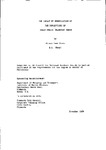THE IMPACT OF DEREGULATION ON THE PERCEPTIONS OF URBAN PUBLIC TRANSPORT USERS
| dc.contributor.author | Green, Alison Jane | |
| dc.contributor.other | Faculty of Science and Engineering | en_US |
| dc.date.accessioned | 2013-09-16T11:24:07Z | |
| dc.date.available | 2013-09-16T11:24:07Z | |
| dc.date.issued | 1989 | |
| dc.identifier | NOT AVAILABLE | en_US |
| dc.identifier.uri | http://hdl.handle.net/10026.1/1749 | |
| dc.description.abstract |
The deregulation of stage carriage bus services represented a major change in the structure and operation of the bus industry in the U.K. Therefore, there existed a need to monitor the effects of the changes brought about by deregulation on the travelling public. Although, many research projects were set up to monitor deregulation, the paucity of attitudinal research meant that this project fills an important gap in the monitoring process. Plymouth was chosen because it had a fairly typical municipal bus operator, and one other major operator. In addition, no other research establishment was doing any detailed research in the South West. Four geographical areas within Plymouth were selected, in order to provide an in-depth analysis and comparative study between different types of users and different levels of bus service provision. Two large scale postal surveys were conducted, one nine months before deregulation and one three months after. As a result of the findings from these surveys, a panel of respondents was set up who were interviewed three times, at four monthly intervals. An attempt was made to link the findings obtained in the factor analysis from the first postal surveys to the in-depth analysis in the panel surveys. The panel surveys used the Fishbein Expectancy Value Model as a theoretical base because it is designed on the hypothesis that people integrate large numbers of pieces of information to arrive at an overall judgement. This ties in well with the findings of the postal surveys. In addition, the Fishbein model permits respondents to make a judgement about the bus service based on factors which are important to them, rather than on a prescribed list of attributes. The extension of the general postal surveys to the examination of individual perceptions is seen as an important aspect of the study. | |
| dc.description.sponsorship | Plymouth City Council, Corporate Planning Office, Civic Centre, Plymouth. | en_US |
| dc.language.iso | en | en_US |
| dc.publisher | University of Plymouth | en_US |
| dc.title | THE IMPACT OF DEREGULATION ON THE PERCEPTIONS OF URBAN PUBLIC TRANSPORT USERS | en_US |
| dc.type | Thesis | |
| plymouth.version | Full version | en_US |
| dc.identifier.doi | http://dx.doi.org/10.24382/3309 |
Files in this item
This item appears in the following Collection(s)
-
01 Research Theses Main Collection
Research Theses Main


